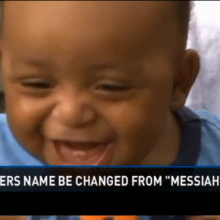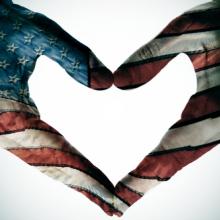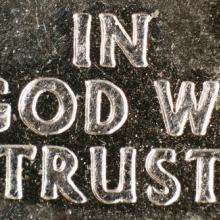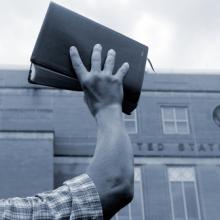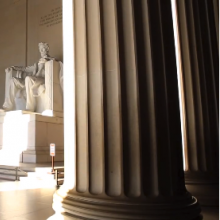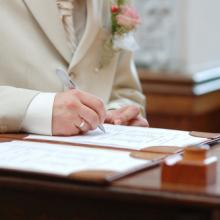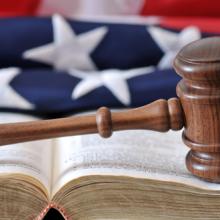Religion and Politics
"They want their supporters to believe this is a divine call, which is not. I think they are manipulating their supporters," said the Rev. Wilybard Lagho, the Mombasa Roman Catholic archdiocese vicar general.
In 2010, when he first gave the opening prayer, the U.S. religious scene was far from idyllic.
In France’s highly secularized society, anyone who talks about religion and politics risks being written off as a closet demagogue, a Catholic traditionalist, or a potential radical Islamist. Officially, the twain should never meet.
Almost three-quarters of Trump voters said Islam is a threat, compared with 18 percent of those who voted for Hillary Clinton. An even higher percentage — 81 percent — of Trump voters strongly agreed that Middle East refugees are a terror threat, compared with 12 percent of Clinton voters.
“Today, divisions in the American public are stark,” said Paul Froese, a Baylor University sociology professor and director of Baylor Religion Surveys. “We can trace many of our deep differences to how people understand traditional morality, theology, and the purpose of our nation.”
In the summer of 430, the great Christian writer and bishop Augustine of Hippo lay dying as barbarians besieged his North African city – basically a mop-up operation in the slow-motion fall of the Roman Empire.
Today, in the fall of the year 2016, a lot of Christians can relate.
Ted Cruz became the first major candidate to declare a presidential run for 2016. His formal announcement came yesterday at Liberty University, the largest Christian university in the world.
Cruz’s announcement at Liberty University was an important political strategy. Cruz is the poster child of the Tea Party movement. He wants to spread his influence by appealing to evangelicals. There is no better place to garner the evangelical vote than the largest Christian university on the planet.
Chris Cillizza of the Washington Post says that Cruz’s message at Liberty was essentially this, “I am one of you; I will put my religious faith at the center of this campaign.”
Cruz put his religious faith at the center of his campaign by invoking God and American exceptionalism, while at the same time critiquing Democrats and Obamacare. Liberty students cheered as Cruz passionately claimed, “God bless Liberty University ... God’s blessing has been on America from the very beginning of this nation, and I believe God isn’t done with America yet. I believe in you. I believe in the power of millions of courageous conservatives rising up to re-ignite the promise of America.”
Cruz is the first serious candidate to officially throw his hat in the presidential ring. Because he quickly invoked God, it’s a safe bet that future Republican and Democratic candidates will also invoke the blessings of God the Almighty.
So, let’s talk God and politics.
To avoid conflict, it is suggested that friendly conversation omits three things: money, politics, and religion. However, it’s no secret that in current Washington discourse two of these things seem to be indefinitely intertwined. I’ll give you a hint — it’s not “money and religion.”
In the past decade, the intimate relationship between money and politics has infiltrated the public sphere at an alarming rate: corporations set public policy agenda items, super PACS have unlimited reign over campaign finance, and just 0.4 percent of the U.S. population is responsible for funding 63 percent of candidate campaigns, political parties, and PACs.
But what do money and politics have to do with religion? Patrick Carolan, Executive Director of Franciscan Action Network (FAN), explained last week to a group of faith leaders at Catholic University why faith, money, and politics are interconnected.
Air Force Academy cadets will no longer be required to include the words “so help me God” when taking their annual Honor Oath.
On Friday officials at the Colorado Springs, Colo., campus announced its 4,000 current cadets would be allowed to opt out of the final phrase of their honor code, which they reaffirm each of their four years of study and training.
“Here at the Academy, we work to build a culture of dignity and respect, and that respect includes the ability of our cadets, Airmen and civilian Airmen to freely practice and exercise their religious preference — or not,” said Lt. Gen. Michelle Johnson, the academy’s superintendent, in a statement.
“So in the spirit of respect, cadets may or may not choose to finish the Honor Oath with ‘So help me God.’”
The current oath reads: “We will not lie, steal or cheat, nor tolerate among us anyone who does. Furthermore, I resolve to do my duty and to live honorably, so help me God.”
A commission of religious leaders has called for clarity in churches’ ability to endorse candidates and issues from the pulpit without fear of losing their tax-exempt status.
In a report sent Wednesday to Sen. Charles Grassley, an Iowa Republican who has spent years investigating the finances of high-profile televangelists, the commission called the regulation of speech of religious organizations “disturbing and chilling.”
“The IRS guidelines are very vague, so ministers and nonprofit leaders are afraid of the [appropriate] line,” said Michael Batts, the independent commission’s chairman. “We think it can be fixed without creating a monster of unintended consequences.”
The Commission on Accountability and Policy for Religious Organizations grew out of Grassley’s probe of ministry finances and makes recommendations for greater transparency and reform. It is overseen by the Evangelical Council for Financial Accountability, which was founded in 1979 as a watchdog on ethical and financial wrongdoing.
In Wednesday’s report, the commission recommended that members of the clergy should be able to say “whatever they believe is appropriate” from the pulpit without fear of IRS reprisal. Since 1954, IRS regulations allow clergy to speak out on issues but they must refrain from endorsing specific candidates.
A Tennessee judge should not have barred a couple from naming their child “Messiah,” said the executive director of the American Civil Liberties Union of Tennessee.
On Thursday, the parents of the child appeared in Cocke County Chancery Court in Tennessee because they could not agree on a last name.
Child Support Magistrate Lu Ann Ballew ordered the mother, Jaleesa Martin, to change her son’s name to “Martin DeShawn McCullough.” It includes both parents’ last names but leaves out “Messiah.”
“The word Messiah is a title and it’s a title that has only been earned by one person and that one person is Jesus Christ,” Ballew told the 7-month-old’s parents.
I was five years old on Independence Day in 1976. The United States' bicentennial fever had overtaken the entire population. Everything was dressed in red, white, and blue. I remember decorating my tricycle in streamers and balloons for the neighborhood parade. It rained through the entire event, and although I crossed the finish line covered in red and blue dye, my award for "most colorful float" made it all worth it.
Also attended Willie Nelson's Fourth of July birthday party/concert that same year. We camped out under the stars and enjoyed music for days in a Woodstock-like environment. I remember seeing my first naked adult woman there. She and her family – or some group of friends – were taking a break to bathe in the nearby river. Hey, it was the 70s, remember?
But even there in that hotbed of post-hippie activity, everyone displayed affection for our country. Even those who likely had stood in protest against the Vietnam War only years before rose and placed their hands over their hearts when the national anthem was sung and the flag was unfurled every morning.
Somewhere along the way, the idea seeped into our national consciousness that patriotism and political criticism could no longer coexist. Those who questioned or challenged the agendas or motives of those in power were pegged as patently unpatriotic; in turn, those dissident voices increasingly rejected the commonly embraced symbols of patriotism as mere tokens of jingoist American exceptionalism.
If asked, “what is the most challenging Sunday to preach a sermon?” I suspect few pastors would say July 4th weekend. But as leaders providing spiritual guidance in a country that is often associated with strong nationalistic tendencies, offering a word that speaks to the messy relationship between “God and Country” is a task that American pastors cannot take lightly.
This dilemma of competing loyalties is not new. In both Matthew and Mark, Jesus is approached by opponents who sought to trap him by asking whether they were obligated to pay Roman taxes (Matthew 22:15-22; Mark 12:13-17). An affirmative response would have been a betrayal of faith but a negative answer would be perceived as an act of sedition. Faced with this paradox, Jesus wowed his inquisitors by telling them to give Caesar what was due to Caesar and God what was due to God. Yet, as Franklin Gamwell, notes in Politics as a Christian Vocation, this only raises the question of what belongs to each of the competing authorities. If Christians are called to love God with all our being, then how can anything not belong to God? How can any other authority make a claim of allegiance on our lives?
The Supreme Court agreed Monday to consider whether prayers can be offered at government meetings — a practice that’s been common in Congress and throughout the states for more than two centuries.
The religious expression case, which comes to the court from the town of Greece, N.Y., focuses on the first 10 words of the First Amendment, ratified in 1791: “Congress shall make no law respecting an establishment of religion.”
That Establishment Clause was violated, the 2nd U.S. Circuit Court of Appeals ruled last year, when the Greece Town Board repeatedly used Christian clergy to conduct prayers at the start of its public meetings. The decision created a rift with other appeals courts that have upheld prayer at public meetings, prompting the justices to step in.
A revealing thing happens when you remove yourself from the daily drum of politics and become a mere observer. I did just that last year, during some of the most divisive moments of the presidential election. Sitting back and watching the deluge of insults and accusations that feeds our political system, I witnessed the worst of us as a nation. And I came to the conclusion that it’s time to reframe our priorities.
When did we trade the idea of public servants for the false idols of power and privilege? When did we trade governing for campaigning? And when did we trade valuing those with the best ideas for rewarding those with the most money?
We’ve lost something as a nation when we can no longer look at one another as people, as Americans, and — for people of faith — as brothers and sisters. Differing opinions have become worst enemies and political parties have devolved into nothing more than petty games of blame.
During a three-month sabbatical, observing this mess we’ve gotten ourselves into, I prayed, meditated, read — and then I put pen to paper. The resulting book gets to the root of what I believe is the answer to our current state of unrest. It is not about right and left — or merely about partisan politics — but rather about the quality of our life together. It's about moving beyond the political ideologies that have both polarized and paralyzed us, by regaining a moral compass for both our public and personal lives — by reclaiming an ancient yet urgently timely idea: the common good.
A federal court in Indiana has rejected atheists' requests to preside at wedding ceremonies, saying only clergy or public officials are licensed to solemnize marriages.
A lawsuit filed by the Indiana chapter of the Center for Inquiry argued that an Indiana law that requires marriages to be “solemnized” — made official by signing a marriage license — only by clergy, judges, mayors or local government clerks violates the Constitution.
But Judge Sarah Evans Barker of the U.S. District Court for the Southern District of Indiana ruled on Nov. 30 that marriage has religious roots. Therefore, government regulation of marriage is an act of religious accommodation — not endorsement — and protected by the Constitution.
NEW DELHI — Political leaders in the tiny Buddhist nation of Bhutan have announced a nearly six-month ban on all public religious activities ahead of the upcoming elections, citing the Himalayan nation's constitution that says “religion shall remain above politics.”
A notification by the Election Commission of Bhutan asks people's "prayers and blessings" for the second parliamentary election, expected in June 2013. But it also states that religious institutions and clergy "shall not hold, conduct, organize or host" any public activity from Jan. 1 until the election.
The ban comes a year after the country's religious affairs ministry identified Buddhist and Hindu clergy who should be barred from voting to keep a clear distinction between religion and politics.
Learning to speak as a Christian is one of the most important and often ignored aspects of our discipleship. Nowhere is this fact more obvious than when churches try to talk about politics. When the small group leader makes a disparaging comment about Mitt Romney’s Mormon faith, or a car rolls into the church parking lot with a “NOBAMA” bumper sticker proudly displayed, what do we do?
Is bumper sticker propaganda and negativity the best we have to offer?
Admittedly it can be risky to talk about politics in the local church. All it takes is one idea or statement that flies in the face of someone’s deeply held convictions and that could be the end of our influence and the end of that person’s involvement in our ministry.
Still, the upcoming presidential election will be the defining cultural event of the next six months. If we completely ignore it we are missing a golden opportunity for discipleship.
How can churches have a healthy conversation about politics in the middle of a national election without demonizing the opposition and causing disunity?
I’ve been working on this question for months now, and as part of my preparation I wrote a book called Public Jesus. Here’s a little bit about what I’ve learned in the process:
1) Love the One You’re With
Families of deceased veterans were shocked and angry last year when religious references were banned from funeral rituals and a Memorial Day service at Houston National Cemetery.
A lawsuit eventually resolved the matter, but a House bill would enshrine in law the lessons learned from that isolated incident.
Such protections already exist as a result of the lawsuit and Bush-era policies that protect families’ free exercise of religion at military funerals. However, the bill filed by Rep. John Culberson, R-Texas, would spell out families' rights to religious expression while curtailing the government’s role.
Most people with some sense of universal human dignity have found the screed Pastor Charles Worley issued against the GLBT community from the pulpit recently repugnant. As a Christian who tires of being lumped together with such hateful, violent voices cloaking themselves within the protection of their faith, I can say with confidence that there is nothing about Worley’s rhetoric that is Christian, as I understand it.
But some believe he did more than just smear the image of the Christian faith and denigrate an entire cross-section of the population; some suggest he actually broke the law from the pulpit.
Americans United for Separation of Church and State‘s Barry W. Lynn submitted a letter to the Internal Revenue Service arguing that Worley violated his church’s 501(c)3 nonprofit status by interfering in an election while speaking on behalf of his church.
In The Washington Post, Lisa Miller profiles religion and politics commentator Mark Silk:









